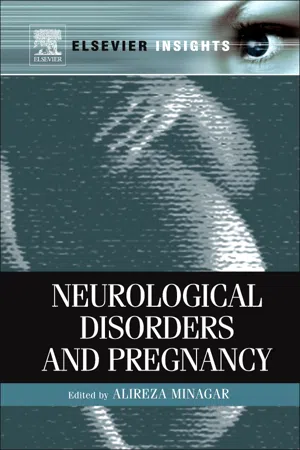1. Pregnancy and Multiple Sclerosis
1Department of Neurology, University of Turku, Turku, Finland
2Isfahan Research Committee of Multiple Sclerosis (IRCOMS), Isfahan, Iran
3Department of Neurology, Isfahan University of Medical Sciences, Isfahan, Iran
4Isfahan Neurosciences Research Center, Isfahan University of Medical Sciences, Isfahan, Iran
5Neuroimmunology Unit, Centre for Neuroscience and Trauma, Blizard Institute of Cell and Molecular Science, Barts and the London School of Medicine and Dentistry, London, UK
Introduction
Multiple sclerosis (MS) is the most common debilitating disease of the central nervous system (CNS) of young adults, with a prevalence of approximately 1 per 1000 in the Western world. About 80% of people with MS are diagnosed between the ages of 20 and 45 and, in adults, the female-to-male ratio is about 2.5 to 1. Hence, the majority of individuals obtaining the diagnosis of MS are women of childbearing age [1]. These women are naturally concerned as to how a pregnancy will affect their disease, how the disease might modify the outcome of the pregnancy and influence the developing child, and how the medication they are using might affect the child. Several studies have been performed to answer these questions and a consensus has been reached about how pregnancy affects MS activity; the relapse rate is typically reduced during late pregnancy but increases in the postpartum period [2][3][4][5] and [6]. The reasons for the increased postpartum activity are not entirely clear, but factors such as the abrupt decrease in estrogen levels immediately following delivery and the loss of immunosuppressive state of pregnancy are likely of importance [7][8] and [9]. There is a general view that MS does not affect the course or outcome of pregnancy, but all original studies addressing these questions are either retrospective and register-based [10][11] and [12], or conclusions have been drawn from very small cohorts [13]. In this chapter, we will review the following: (1) how pregnancy affects the disease activity; (2) pregnancy outcome among MS mothers; (3) treatment of MS mothers during pregnancy and lactation; and (4) immunologic basis of pregnancy-induced disease remission.
How Pregnancy Affects the Disease Activity
Relapses
Pregnancy typically is a stabilizing period in the clinical course of MS. During the third trimester, relapse rate can be 70% lower than the time before pregnancy, but aggravation of the disease commonly is observed after delivery.
Several early retrospective studies suggested that pregnancy has a beneficial effect on the clinical course of MS [2] and [14], but this view was not shared by all investigators [15] and [16]. Uncertainty about how to advise young women with MS on family planning was resolved after the publication of the PRISMS study [5]. In the largest prospective study so far to evaluate the effect of pregnancy on the clinical activity of MS, Confavreux et al. [5] followed 254 women with MS through 269 pregnancies. The study was conducted as a multicenter study in 12 European countries. The enrollment was performed between 4 and 36 gestational weeks, and follow-up was continued for 1 year after delivery. Data were collected on relapse frequency and disability. During the year before pregnancy, 164 relapses occurred among the 227 women who were followed for the entire observation period, resulting in an annual relapse rate of 0.7. During pregnancy the relapse frequency steadily declined and reached the minimum annual relapse rate of 0.2 during the third trimester of pregnancy (meaning that during the third trimester only 12 of 225 women [=5%] experienced a relapse). In the 3 months following delivery, the number of relapses increased dramatically to 68 of 222 women (=31%; annual mean relapse rate: 1.2, P < 0.001 versus relapse rate during the year preceding pregnancy). A high frequency of relapses during pregnancy and a high level of physical disability before pregnancy were identified as predictors of postpartum attacks [17]. A similar pattern of lack of active inflammation during pregnancy and an increase in signs of inflammation during the postpartum phase has been observed in studies using serial magnetic resonance imaging (MRI) [18] and [19]. In addition, Saraste et al. [20] described a patient with a record number of 200 gadolinium-enhancing lesions in a brain MRI scan performed only 4 weeks after delivery.
MRI Activity During and After Pregnancy
MRI is widely used during pregnancy, either for fetal or maternal diagnostics. In most cases, because of theoretical concerns, MRIs are not performed during the first trimester. Rise in body temperature especially locally in the uterus and acoustic noise exposure have been mentioned as potential risks. In animals, gadolinium has not been shown to be teratogenic but safety data in humans concerning gadolinium administration during pregnancy are lacking. Hence, use of gadolinium should be avoided during pregnancy.
Paavilainen et al. [19] reported the first MRI study of a larger MS cohort (28 patients), which addressed disease activity during pregnancy and the postpartum period...
